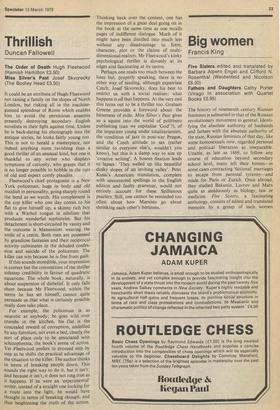Thrillish
Duncan Fallowell
The Order of Death Hugh Fleetwood (Hamish Hamilton £3.50) Miss Silver's Past Josef Skvorecky (The Bodley Head £3.50) It could be an attribute of Hugh Fleetwood not raising a family on the slopes of North London, but risking all in the machinegunned splendour of Rome which enables him to avoid the pernicious anaemia presently destroying secondary English novelists in their fight against time. Unless he is back-dating his photograph into the antique sixties, he looks fairly young too. This is not to herald a masterpiece, nor indeed anything more ravishing than a good thriller of an unusual kind, but one is thankful to any writer who displays symptoms of curiosity, who grasps that it is no longer possible to hobble in the ruts of old and expect comfy plaudits.
Fleetwood's chief protagonist is a New York policeman, huge in body and old maidish in personality, going sharply round the bend as we watch. His complement is the cop killer who one day comes to his flat to give himself up, a skinny rich boy with a Warhol tongue in nihilism that produces wonderful sophistries. But his detachment is short-circuited by vanity and the outcome is Mansonism wearing the smile of a cretin. Both men are possessed by grandiose fantasies and their reciprocal activity culminates in the deluded confession and suicide of the policeman. The killer can win because he is free from guilt.
If this sounds incredible, your impression is correct but the conventions of the thriller sidestep credibility in favour of quadratic equations. The whole book, naturally, is about suspension of disbelief. It only falls short because Mr Fleetwood, within the terms he has set himself, cannot quite persuade us that what is certainly possible really does take place.
For example, the policeman is as neurotic as anybody; he goes wild over crumbs in the kitchen, his flat is the concealed reward of corruption, undefiled by any furniture, not even a bed, clearly the sort of place only to be associated with schizophrenia, the book's arena of action. Yet Fleetwood prefers to proceed step by step as he shifts the practical advantage of the situation to the killer. The author thinks in terms of breaking people down. This sounds the right way to do it, but it isn't ; and because it isn't, it does not ring true as it happens. If he were an 'experimental' writer, instead of a straight one looking for a route into the light, he would have thought in terms of breaking through, arid thus heightening the truth of the action.
Thinking back over the content, one has the impression of a great deal going on in the book at the same time as one recalls pages of indifferent dialogue. Much of it might have been distilled into much less without any disadvantage to form, character, plot or the claims of multidimensional realism. Mr Fleetwood's kinky psychological thriller is slovenly at its edges and fascinating at its centre.
Perhaps one reads too much between the lines but, properly speaking, there is no other way of reading, although expatriate Czech, Josef Skvorecky, does his best to restrict us with a social realism: what happens is all that happens. At the very end this turns out to be a thriller too. Graham Greene provides a foreword about the bitterness of exile. Miss Silver's Past gives us a squint into the world of politburo publishing (can we capitalise 'God' ?), of the impatient young under totalitarianism, the condition of jazz in post-war Prague, and the Czech attitude to sex (rather similar to everyone else's, wouldn't you know), but this is a damp way to size up 'creative writing'. A bosom fixation leads to lapses: 'They welled up like beautiful dusky slopes of an inviting valley'. Petei Kussi's American translation, complete with uncorrected spellings in the English edition and faulty grammar, would not entirely account for these Spillanous pearlers. Still, one cannot be reminded too often about how Marxists go about shrinking each other's horizons.


































 Previous page
Previous page